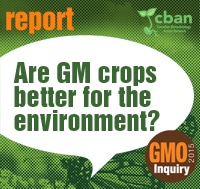2,4-D- and Dicamba-Tolerant Crops
Updates
September 2025 – Consultation on Dicamba Use: The Pest Management Regulatory Agency (PMRA) of Health Canada has proposed a ban on the “over the top” use of dicamba in growing soybeans, which would ban use of the pesticide after the crop starts growing. The measure is designed to reduce the risk of damage to other crops from spray drift. PMRA researchers concluded that dicamba has the potential to volatilize and move off-site throughout the entire growing season (volatilization is where the herbicide evaporates from the soil or plant tissue following application). From 2015-25, there were 101 reported cases of damage to non-target plants. Bayer argues that it has developed a “low volatility formulation” of dicamba, specifically designed for its genetically engineered glyphosate- and dicamba-tolerant Roundup Ready Xtend soybeans. The PMRA is consulting until November 1, 2025.
Introduction
The herbicide glyphosate and genetically engineered glyphosate-tolerant crops are reaching the end of their life cycle due to the emergence and spread of glyphosate resistant weeds. With no new herbicides on the horizon, seed and pesticide companies are encouraging farmers to use other herbicides and to adopt new GM crops that are tolerant to the additional herbicides such as 2,4-D and dicamba. GM herbicide-tolerant crops are now most often “stacked” with multiple GM traits for tolerance to many herbicides at once, including glyphosate. Click here to see the list of stacked products in Canada (Note: The wheat on this list is not a genetically engineered wheat).
- Canada was the first country in the world, in 2012, to approve 2,4-D-tolerant and dicamba-tolerant crops.
- In 2017, Monsanto (now Bayer) launched its “Roundup Ready Xtend” dicamba-tolerant GM soy, which is also tolerant to glyphosate.
- The GM corn “Enlist“ that is tolerant to 2,4-D plus glyphosate was sold by DowDupont (Corteva) for the first time in Canada in 2018.
The Canadian Biotechnology Action Network (CBAN) and Prevent Cancer Now (PCN) are calling for a review of the use of genetically engineered (genetically modified or GM) herbicide-tolerant crops in Canada:
- Click here to read CBAN’s comments on MON 87429.
- Press Release, August 22, 2019: Call to Re-think Genetically Engineered Herbicide-Tolerant Crops.
2, 4-D-tolerant crops
Health Canada and the Canadian Food Inspection Agency have approved genetically engineered 2,4-D-tolerant crops manufactured by Dow-Dupont (now Corteva) and Bayer.
- Dow has genetically engineered “Enlist” corn and soy to tolerate its “Enlist Duo” herbicide that combines glyphosate and 2,4-D choline. The Enlist corn seeds will also be stacked with Monsanto’s Roundup Ready Corn 2 and SmartStax
- Bayer also has a genetically engineered 2,4-D-tolerant corn and soy, stacked with other herbicide tolerance.

CBAN and Équiterre, Nature Québec, the Canadian Association of Physicians for the Environment, Prevent Cancer Now, and Vigilance OGM denounced regulatory approval of Canada’s first corn and soy crop plants genetically engineered (also called genetically modified or GM) to tolerate doses of the herbicide 2,4-D because of concerns that the products will lead to increased herbicide use, with more toxic pesticides in the environment and our food. Press Release – November 19, 2012: GM 2,4-D-Tolerant Crops set to Accelerate Pesticide Use: Groups denounce government approvals as reckless
Dicamba-tolerant crops
- Bayer has approval for six GM dicamba-tolerant events, for canola, corn, and soybean (and cotton). Bayer’s corn MON-87429-9 is tolerant to dicamba, 2,4-D and glyphosate, for example.
- In 2019, Monsanto asked for approval for a GM corn (MON 87429) that is tolerant to dicamba, 2,4-D / quizalofop and glufosinate. Click here to read comments on MON 87429 to the Canadian Food Inspection Agency from CBAN and Prevent Cancer Now.
There are already 16 species of 2,4-D resistant weeds around the world (five in the US and two in Canada) and six species resistant to dicamba, (two in the US and two in Canada). Charles Benbrook has predicted that widespread use of 2,4-D resistant crops in the US could increase herbicide use by another 50% (Benbrook, C., 2012. Impacts of genetically engineered crops on pesticide use in the U.S. – the first sixteen years. Environmental Sciences Europe, 24.) For details, check CBAN’s GMO Inquiry report “Are GM Crops Better for the Environment?”
Drift from dicamba use on soybeans and cotton has caused widespread damage to crops in the US. Many farmers who were growing soybeans that were not dicamba-tolerant have switched to buying GM dicamba-tolerant seeds in order to protect their crop from dicamba drift from neighbouring farms. Several lawsuits have been filed on behalf of farmers who argue that Monsanto violated antitrust law by selling dicamba-tolerant seeds: the lawsuits claim that the company understood that the risk of drifting dicamba could drive competitors out of the market.
- In June 2020, a U.S. court overturned the registration of the herbicide dicamba in that country, because of the “enormous and unprecedented” damage to neighbouring crops from pesticide drift.
- Damage in Arkansas was so extensive that the state’s Pesticide Committee recommended a ban on in-crop dicamba use in 2017.
- The US Environmental Protection Agency reported it has an “unusually high number of reports of crop damage that appear related to misuse of herbicides containing the active ingredient dicamba”. The EPA has not yet approved Monsanto’s new dicamba formula which is designed to reduce drift. Read the news story here.
- In Canada: “We’re not just going to be spraying glyphosate on soybeans any more. We need two modes of action and we have to keep the drift from reaching other crops.” Read the news story here.
For more information see www.cban.ca/pesticides





